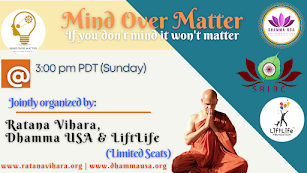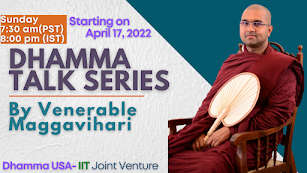Dhamma Talk at Lankarama Buddhist Institute
398 Giano Ave, La Puente, CA 91744
Date: August 5, 2017
Time: 6:00 PM
Evaṃ me sutaṃ— ekaṃ samayaṃ bhagavā sāvatthiyaṃ viharati jetavane anāthapiṇḍikassa ārāme. Tatra kho bhagavā bhikkhū āmantesi: “bhikkhavo”ti. “Bhadante”ti te bhikkhū bhagavato paccassosuṃ. Bhagavā etadavoca:
(Thus have I heard. On one occasion the Blessed One was living at Sāvatthī in Jeta’s Grove, Anāthapiṇḍika’s Park. There he addressed the bhikkhus thus: “Bhikkhus.”—“Venerable sir,” they replied. The Blessed One said this:)
ācāragocarasampannā aṇumattesu vajjesu bhayadassāvino; samādāya sikkhatha sikkhāpadesu.
(“Bhikkhus, dwell possessed of virtue, possessed of the Pātimokkha, restrained with the restraint of the Pātimokkha, perfect in conduct and resort, and seeing fear in the slightest fault, train by undertaking the training precepts.)
(“If a bhikkhu should wish: ‘May I be dear and agreeable to my companions in the holy life, respected and esteemed by them,’ let him fulfil the precepts, be devoted to internal serenity of mind, not neglect meditation, be possessed of insight, and dwell in empty huts.)
(‘May I be one to obtain robes, almsfood, resting place, and medicinal requisites,’)
(‘May the services of those whose robes, almsfood, resting place, and medicinal requisites I use bring them great fruit and benefit,’)
(‘When my kinsmen and relatives who have passed away and died remember me with confidence in their minds, may that bring them great fruit and great benefit,’)
(‘May I become a conqueror of discontent and delight, and may discontent not conquer me; may I abide transcending discontent whenever it arises,’ )
(‘May I become a conqueror of fear and dread, and may fear and dread not conquer me; may I abide transcending fear and dread whenever they arise,’)
(‘May I become one to obtain at will, without trouble or difficulty, the four jhānas that constitute the higher mind and provide a pleasant abiding here and now,’)
(‘May I contact with the body and abide in those liberations that are peaceful and immaterial, transcending forms,’)
(‘May I, with the destruction of three fetters, become a stream-enterer, no longer subject to perdition, bound for deliverance, headed for enlightenment,’)
(‘May I, with the destruction of three fetters and with the attenuation of lust, hate, and delusion, become a once-returner, returning once to this world to make an end of suffering,’)
(‘May I, with the destruction of the five lower fetters, become due to reappear spontaneously in the Pure Abodes and there attain final Nibbāna, without ever returning from that world,’)
eko assaṃ; āvibhāvaṃ tirobhāvaṃ; tirokuṭṭaṃ tiropākāraṃ tiropabbataṃ asajjamāno gaccheyyaṃ, seyyathāpi ākāse; pathaviyāpi ummujjanimujjaṃ kareyyaṃ, seyyathāpi udake; udakepi abhijjamāne gaccheyyaṃ, seyyathāpi pathaviyaṃ; ākāsepi pallaṅkena kameyyaṃ, seyyathāpi pakkhī sakuṇo; imepi candimasūriye evaṃmahiddhike evaṃmahānubhāve pāṇinā parāmaseyyaṃ parimajjeyyaṃ; yāva brahmalokāpi kāyena vasaṃ vatteyyan’ti.
(‘May I wield the various kinds of supernormal power: having been one, may I become many; having been many, may I become one; may I appear and vanish; may I go unhindered through a wall, through an enclosure, through a mountain as though through space; may I dive in and out of the earth as though it were water; may I walk on water without sinking as though it were earth; seated cross-legged, may I travel in space like a bird; with my hand may I touch and stroke the moon and sun so powerful and mighty; may I wield bodily mastery, even as far as the Brahma-world,’)
(‘May I, with the divine ear element, which is purified and surpasses the human, hear both kinds of sounds, the divine and the human, those that are far as well as near,’)
(‘May I understand the minds of other beings, of other persons, having encompassed them with my own mind. May I understand a mind affected by lust as affected by lust and a mind unaffected by lust as unaffected by lust; may I understand a mind affected by hate as affected by hate and a mind unaffected by hate as unaffected by hate; may I understand a mind affected by delusion as affected by delusion and a mind unaffected by delusion as unaffected by delusion; may I understand a contracted mind as contracted and a distracted mind as distracted; may I understand an exalted mind as exalted and an unexalted mind as unexalted; may I understand a surpassed mind as surpassed and an unsurpassed mind as unsurpassed; may I understand a concentrated mind as concentrated and an unconcentrated mind as unconcentrated; may I understand a liberated mind as liberated and an unliberated mind as unliberated,’)
15. ‘anekavihitaṃ pubbenivāsaṃ anussareyyaṃ, seyyathidaṃ—ekampi jātiṃ dvepi jātiyo tissopi jātiyo catassopi jātiyo pañcapi jātiyo dasapi jātiyo vīsampi jātiyo tiṃsampi jātiyo cattālīsampi jātiyo paññāsampi jātiyo jātisatampi jātisahassampi jāti satasahassampi anekepi saṃvaṭṭakappe anekepi vivaṭṭakappe anekepi saṃvaṭṭavivaṭṭakappe—amutrāsiṃ evaṃnāmo evaṅgotto evaṃvaṇṇo evamāhāro evaṃsukhadukkhappaṭisaṃvedī evamāyupariyanto, so tato cuto amutra udapādiṃ; tatrāpāsiṃ evaṃnāmo evaṅgotto evaṃvaṇṇo evamāhāro evaṃsukhadukkhappaṭisaṃvedī evamāyupariyanto, so tato cuto idhūpapannoti. Iti sākāraṃ sauddesaṃ anekavihitaṃ pubbenivāsaṃ anussareyyan’ti.
(‘May I recollect my manifold past lives, that is, one birth, two births, three births, four births, five births, ten births, twenty births, thirty births, forty births, fifty births, a hundred births, a thousand births, a hundred thousand births, many aeons of world-contraction, many aeons of world-expansion, many aeons of world-contraction and expansion: ‘There I was so named, of such a clan, with such an appearance, such was my nutriment, such my experience of pleasure and pain, such my life-term; and passing away from there, I reappeared elsewhere; and there too I was so named, of such a clan, with such an appearance, such was my nutriment, such my experience of pleasure and pain, such my life-term; and passing away from there, I reappeared here.’ Thus with their aspects and particulars I recollected my manifold past lives.,’)
16. ‘dibbena cakkhunā visuddhena atikkantamānusakena satte passeyyaṃ cavamāne upapajjamāne hīne paṇīte suvaṇṇe dubbaṇṇe sugate duggate yathākammūpage satte pajāneyyaṃ—ime vata bhonto sattā kāyaduccaritena samannāgatā vacīduccaritena samannāgatā manoduccaritena samannāgatā ariyānaṃ upavādakā micchādiṭṭhikā micchādiṭṭhikammasamādānā, te kāyassa bhedā paraṃ maraṇā apāyaṃ duggatiṃ vinipātaṃ nirayaṃ upapannā; ime vā pana bhonto sattā kāyasucaritena
samannāgatā vacīsucaritena samannāgatā manosucaritena samannāgatā ariyānaṃ anupavādakā sammādiṭṭhikā sammādiṭṭhikammasamādānā, te kāyassa bhedā paraṃ maraṇā sugatiṃ saggaṃ lokaṃ upapannāti, iti dibbena cakkhunā visuddhena atikkantamānusakena satte passeyyaṃ cavamāne upapajjamāne hīne paṇīte suvaṇṇe dubbaṇṇe sugate duggate yathākammūpage satte pajāneyyan’ti.
(‘May I, with the divine eye, which is purified and surpasses the human, see beings passing away and reappearing, inferior and superior, fair and ugly, fortunate and unfortunate. May I understood how beings pass on according to their actions thus: ‘These worthy beings who were ill conducted in body, speech, and mind, revilers of noble ones, wrong in their views, giving effect to wrong view in their actions, on the dissolution of the body, after death, have reappeared in a state of deprivation, in a bad destination, in perdition, even in hell; but these worthy beings who were well conducted in body, speech, and mind, not revilers of noble ones, right in their views, giving effect to right view in their actions, on the dissolution of the body, after death, have reappeared in a good destination, even in the heavenly world.’ Thus with the divine eye, which is purified and surpasses the human, may I see beings passing away and reappearing, inferior and superior, fair and ugly, fortunate and unfortunate, and I understood how beings pass on according to their actions.)
17. Ākaṅkheyya ce, bhikkhave, bhikkhu: ‘āsavānaṃ khayā anāsavaṃ cetovimuttiṃ paññāvimuttiṃ diṭṭheva dhamme sayaṃ abhiññā sacchikatvā upasampajja vihareyyan’ti, sīlesvevassa paripūrakārī ajjhattaṃ cetosamathamanuyutto anirākatajjhāno vipassanāya samannāgato brūhetā suññāgārānaṃ.
(“If a bhikkhu should wish: ‘May I, by realising for myself with direct knowledge, here and now enter upon and abide in the deliverance of mind and deliverance by wisdom that are taintless with the destruction of the taints,’ let him fulfil the precepts, be devoted to internal serenity of mind, not neglect meditation, be possessed of insight, and dwell in empty huts.)
(“So it was with reference to this that it was said: ‘Bhikkhus, dwell possessed of virtue, possessed of the Pātimokkha, restrained with the restraint of the Pātimokkha, perfect in conduct and resort, and seeing fear in the slightest fault, train by undertaking the training precepts.’”)
(That is what the Blessed One said. The bhikkhus were satisfied and delighted in the Blessed One’s words.)
Ākaṅkheyya suttaṃ niṭṭhitaṃ chaṭṭhaṃ.
Reference: On the basis of Ākaṅkheyya sutta
DATE : AUGUST 5, 2017
7:00 PM - Twenty Eight Buddha Vandana &
Light Dinner will be provided.
- REST OF THE EVENTS HAPPENING AT LANKARAMA BUDDHIST INSTITUTE:
"The Supreme Goal of Every Good Buddhist as reflected in the
Ākaṅkheyya Sutta (Majjhima Nikaya 6)"
7:00 PM - Twenty Eight Buddha Vandana &
Protective Paritta Chanting followed by Bodhi Vandana
Light Dinner will be provided.
This Dhamma Event is sponsored by
- Pali Study Group &
- UBEF Study Groups
ALL ARE WELCOME!
IT IS FREE AND OPEN TO ALL

















































0 comments:
Post a Comment
Your comments and feedback are very helpful to us in improving our posts. We really appreciate your time. Thank you!
Dhamma USA Team.